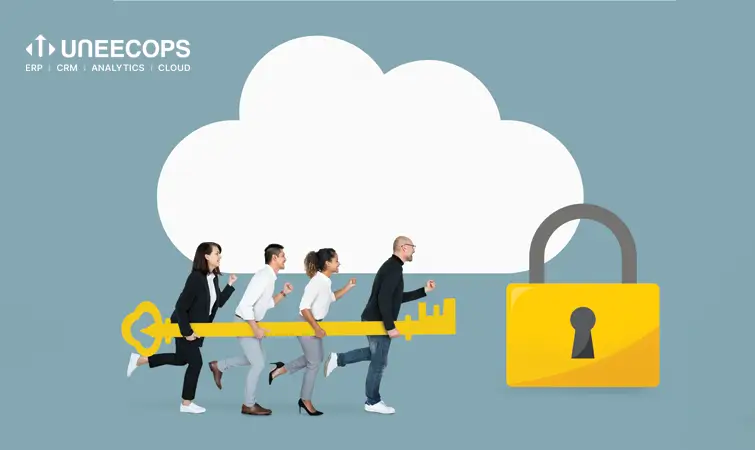Today, all the successful businesses you see have come this far because they have played strategically and have minimized their expenses to grow sustainably and increase their profits. Implementing a Cloud ERP in your company is one of the easiest ways to run agile, stay resilient and relevant while saving lots of money.
An ERP is software that builds a virtual bridge between all the departments in your company. The end result is an efficient business process, minimal back and forths and no information bottlenecks. All these come down to the reduction in expenses. This cost-saving gets further accelerated if the ERP runs on the cloud. How? Read on…
Let’s divide the article into two parts –
- ERP = Cost Savings
- Cloud ERP = Cost Savings Multiplied
A. ERP = Cost Saving
ERP – whether cloud or on-premise is in itself a great cost-saving tool. Here are various use cases of ERP that specifically relate to cost-saving.
1. Minimum Back and Forths, Maximum Automation
ERP binds the elements of a business. With an ERP solution, the departments of a company can work as a whole. Information passes freely. There’s little chance of misunderstanding and data misrepresentation.
Here’s the story of a major Pharma company that used to suffer from raw material shortage when they didn’t have an end-to- end connected ERP solution. Most Pharma companies experience haphazard medicine demand which results in rapid increase of raw materials usage that’s way higher than the assumed level.
Our client, too, suffered from this issue. There were two things needed to be done. One, the inventory and the production department needed to have better, quicker communication with the sales and marketing department. And secondly, the company painfully needed a system that could forecast the medicine demand based on historical data. We implemented the ERP solution for our client. And after a few handholding, the production department can have a real time view of the marketing campaign and sales record. And with intelligent forecasting, the company achieved the coveted Just-In-Time production paradigm.
2. Reduced Fumbling – ERP Makes The Business Operations Transparent
No matter how hard we try, the business process will get modified if we don’t use an ERP. Why? Because each human being has their own way of doing things. This will result in a haphazard business process. An ERP keeps the business process in shape. The employees can see what step to follow next. The process remains standard.
3. Intelligent Inventory Management
Optimising the inventory management process can drastically reduce operational expenses. For example, you might notice from the ERP report that one kind of finished product in your warehouse has slow movement. But its production has not been reduced. So, thanks to the report generated by the ERP, you can now free up space in your warehouse by reducing the production of that product.
4. Easy Record-Keeping
Organising the papers, files, and other records for internal and external audits can be time consuming and expensive. But if your company has an ERP in place, every transaction, every process and every decision are logged and recorded. This ensures smooth and inexpensive record keeping.
5. Intelligent Supply Chain Management
Data analysis reveals confidential information. An ERP software analyses the business data and provides information that we can use to cut costs. This is specifically true in the case of supply chain management. Suppose you have four vendors for your manufacturing plant. You can analyse the historical data from the ERP to analyse which vendor delivers raw materials quickly, which vendor charges less and which vendor does both.
B. Cloud ERP = Cost-Saving Multiplied
Now that you know how ERP saves operations costs, let’s see how a cloud-based ERP can further reduce costs.
1. No Upfront Cost
One of the reasons companies think twice before implementing an ERP software is its upfront cost. This is where cloud-based versions of SAP and other ERP software come to their rescue. Companies do not have to pay a huge amount of money upfront if they opt for cloud ERP software, as most of them have a yearly subscription model.
You must be thinking that paying a subscription amount every year can quickly add up and exceed the upfront cost. No, it won’t. Here’s why –
2. No Need To Buy Expensive Hardware
If a company opts for a Cloud ERP, there’s no need to buy and maintain expensive hardware. So you save on the monthly maintenance cost of the hardware.
3. You Don’t Need A Large IT Team If You Opt For Cloud ERP
Another advantage of cloud ERP is that you don’t need a large IT team to keep the ERP software up and running 24/7. The updates happen over the air.
Even in case you experience any performance issue, you get a great hand-holding if you buy the ERP software from a CMMI level 5 certified vendor like Uneecops. Needless to say, you save a huge amount of money as it is possible to keep the IT team lean.
4. No Disruption Even After An Update
On-premise ERP has to be updated once in a while to keep it in line with the changing business demands. But these updates can cost you twice. One, you have to pay for the updates. And secondly, you have to hire specialists to iron out bugs and incompatibilities. But with cloud ERP, the update cost is included in the subscription fees
5. Cut Security, Compliance and Miscellaneous Costs
Keeping the on-premise ERP and the related hardware secure is quite expensive. Companies work with sensitive customer data. Any data leak would result in lawsuits and reputation-damage. Hence, if they use an on-premise ERP database and application layers, they have to keep the server secure – both from physical attacks and virtual attacks. From dedicated secure buildings, CCTVs, security personnel and what not to antivirus and firewall – data security is a never-ending expense. For example, a simple firewall will cost a company $450 to $2500. Then there’s the added subscription cost of $50 to $6000.
With cloud ERP, you can avoid the data security expense to a large extent. Of course, you have to keep your side of the network secure and maintain proper access control. But beyond that, keeping the server and database secure are the responsibilities of the ERP company like Uneecops.
A 2014 study shows that using a cloud ERP can reduce expenditures by 15% compared to those companies that use on-premise ERP. We at Uneecops are here to guide you if you need to upgrade your on-premise ERP to a cloud-based one. And, if your company still runs on legacy software, it’s the perfect time to switch to a cloud ERP software like SAP Business One or SAP Business ByDesign. So, come, let’s make your business process smarter.







